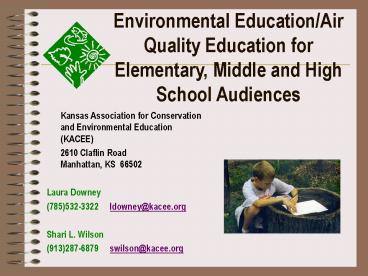Why Use Environmental Education in Your School - PowerPoint PPT Presentation
1 / 12
Title:
Why Use Environmental Education in Your School
Description:
Environmental Education/Air Quality Education for Elementary, Middle and ... Overview and review of Ozone Protocol, Lichen and Milkweed Field trip from http: ... – PowerPoint PPT presentation
Number of Views:54
Avg rating:3.0/5.0
Title: Why Use Environmental Education in Your School
1
Environmental Education/Air Quality Education for
Elementary, Middle and High School Audiences
Kansas Association for Conservation and
Environmental Education (KACEE) 2610
Claflin Road
Manhattan, KS 66502
Laura Downey (785)532-3322
ldowney_at_kacee.org Shari L. Wilson (913)287-6879
swilson_at_kacee.org
2
What is Environmental Education/Air Quality
Education?
- NOT environmental advocacy rather EE promotes a
full understanding of environmental issues
through the education process - a process directed at creating awareness and
understanding of environmental issues, leading to
responsible and informed individual and group
actions. - Heavy emphasis on using the environment as a
context to learn critical thinking,
problem-solving and decision-making skills - Guidelines for Excellence in Environmental
Education available at www.naaee.org
3
Support for Environmental Education
In Kansas, 94 of those surveyed believe it is
important to teach EE in schools (KDHE Survey of
General Public, 1998).
95 of adults and 96 of parents in the US
support Environmental Education being taught in
schools (National Report Card on Environmental
Knowledge, Attitude and Behaviors, 2001).
4
Who We AreKACEE Membership
KACEE was established in 1969 as a public/private
partnership with currently more than 200
organizational members and an additional 300
individual members.
- Business Industry
- Organizations
- Federal, State, Local Agencies
- Colleges Universities
- Schools School Districts
5
What We DoKACEE Activities
- Environmental Education Workshops
- Facilitator Training
- Water Festivals
- KS Environmental Education Conference
- Networking Partnerships
- Special Programs
- Ongoing Membership Communications
- Online EE Community www.kacee.org
6
Sample Activity
- Project Learning Tree-Air Quality Viewpoints On
the Line (sample activity)
7
What to Do With SchoolsEE/Air Quality
Possibilities
- Conduct hands-on activities with classrooms
- Help create and support Air Quality Monitoring
Teams - Help to host/organize Teacher Workshops on EE/Air
Quality - Work with School-Based Green Teams
- Impact Greenspace/Tree Planting Projects
8
Teacher WorkshopSample Agenda
- The Idea Pool (Project WET, p. 7) Air
Quality-Pre-Assessment of participants knowledge
on air/air quality - What Is Air? Exploring the Properties of Air
(EPA Materials), Inflate a Teacher, Cup in Water,
Balancing Act - Finding Sources of Air Pollution in Our
Community (EPA, p. 115), Invent an Air Monitor
(EPA, p. 105) and Particulate Collectors,
design and place - What are the Risks of Air Pollution? (PLT
Secondary Risk Module and Air Quality Issues,
Understanding Probability) - Minimizing Risks The Role of Plants (PLT Air
Plants Activity) - Science Pioneers Overview and review of Ozone
Protocol, Lichen and Milkweed Field trip from
http//pathfinderscience.net - Indoor Air Quality (PLT Secondary Module on
Risk-Radon) - Air Quality Values on the Line (PLT Activity and
wrap-up)
9
School Projects
- Kansas Green SchoolsComing Soon!! (Funding
through the Bureau of Air and Radiation) - Tools and resources for combining school greening
activities and education - Small grant opportunities for schools
- Air Quality Monitoring Teams
- collect ongoing air quality data
- use http//pathfinderscience.net protocols
10
Community Projects
- Greenspace/Tree Planting Projects
- work with schools, scouts, etc.
- create more community greenspace
- plant trees
11
Potential Partners/Resources
- Kansas Association for Conservation and
Environmental Education (www.kacee.org) - Local Health Departments
- Pathfinder Science http//pathfinderscience.net
- EPA Resources http//www.epa.gov/teachers/curric
-air.htm
12
Discussion
- In what ways could/should businesses, industries,
local governments, community leaders and
environmental consultants be involved in
environmental/air quality education and outreach? - How can KACEE support that involvement?































